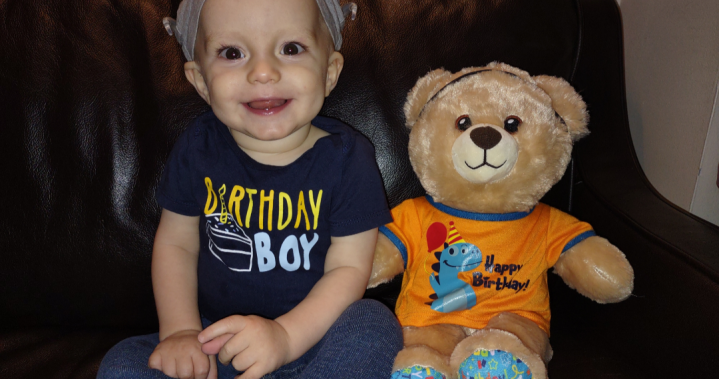‘Hearing shouldn’t be for the privileged’: Family fights for cochlear implant coverage | Globalnews.ca
Erica Hall knew her son couldn’t hear the day he was born.
Doctors believed it may have been fluid in his ear that caused the newborn to fail his hearing screening, but Hall said she knew through his “startled” movement that it was more than that.
Four months later, doctors told Hall and her husband, who live in Mississauga, Ont., that their son Greyson had profound hearing loss due to genetics that the parents unknowingly carried.
But with the help of cochlear implants in both ears, Greyson was given the gift of sound. He is now 18 months old and able to listen and dance to music.
Cochlear implants are surgically inserted medical devices designed to improve hearing for people with significant hearing loss. Unlike hearing aids, which amplify existing hearing abilities, implants act as a substitute for non-functional or damaged inner ear structures, directly stimulating the auditory nerve, according to the Canadian Hard of Hearing Society.
The surgery, which is performed under general anesthesia, usually lasts a few hours, and patients can typically be discharged from the hospital on the same day.
“Over the past almost year since he’s received his devices, it has been absolutely amazing,” Hall told Global News. “Upon diagnosis, I thought he would never experience music, he would never be able to dance to a beat, and I’ve seen it. And when I see it, I cry tears of complete joy. The best decision we’ve made for him was the surgery and to embrace cochlear implants.”
Eighteen-month-old Greyson Hall was born profoundly deaf due to genetics that both his parents carried.
Erica Hall
The cochlear implants, including surgery, cost around $100,000 and were covered by the province. However, the implants may need to be replaced or upgraded every five to 10 years (due to wear and tear or as parts become obsolete), and in Ontario, the second pair is only partially covered.
“The cochlear implants are very expensive,” Hall said. “Once that warranty is up at the age of five, we are responsible for paying for the replacement device and that cost is over $11,000 out of pocket.”
“We just we need help affording it because hearing shouldn’t be for the privileged, and that’s what I feel Ontario has made it to be.”
And now they may have to pay double the price.
Hall is pregnant with their second child, and after genetic testing, they were told their new baby boy (who is due in July) will also have profound hearing loss.
“I was absolutely devastated. A lot of parents of kids with hearing loss also feel this immense grieving period. You expect your child’s life to be one way, and it’s not,” Hall said. She said while she’s happy both boys are able to “go on this journey together,” she’s stressed about the financial strain on the family as they do not have private insurance.
Ontario has its Assistive Devices Program (ATP), which covers up to 75 per cent of assisted speech processors, like cochlear implants. However, there is a cap for replacement devices.

Bonnie Cooke is an audiologist and director of audiology at Speech Language and Audiology Canada. She said a single cochlear implant device (for one ear) costs on average between $11,000 and $15,000.
With the cap, that means ATP will cover around $5,444 and the rest is usually out of the patient’s pocket for a replacement device, she said.
“It’s a huge cost, especially in many cases people will have two implants,” Cooke said. “The lifespan of a cochlear implant processor can be anywhere from five to 10 years at the most. So if your child is implanted with a set of cochlear implants by the age of one, you’re looking to sort of have to map out savings to ensure that they have new processors every five to 10 years.”
Cochlear implant coverage also varies across Canada, she said.
For example, Saskatchewan has a co-pay program, which means families pay $840 per replacement device. In Nova Scotia, the government fully covers replacements.
“It’s unfortunate that it’s not the same. But one thing that is the same, is that the initial cochlear implant is funded the same across (all) provinces. And so that’s great,” Cooke said.
A 2019 survey by Statistics Canada found that at least 1.3 million Canadians aged 15 years and over have a hearing disability. Some 319,000 Canadians with a hearing disability do not use a hearing aid or cochlear implant, though they need them; of these, 66 per cent said it was because of the cost.
Erica Hall, who is pregnant with her second child, pictured with her son Greyson.
Erica Hall
Hearing loss is also on the rise across the country, according to Anne Marie Langlois, manager of programs and services accessibility and employment at the Canadian Hard of Hearing Association (CHHA).
She explained that hearing loss is not only a health issue but a social one as well, as there is a “sense of isolation” that comes with it.
“Individuals who struggle with communication, those individuals are impacted throughout their lives socially, at work and being able to maintain health and well-being,” Langlois said, adding that she believes it’s important that the government invests in hearing care to make sure the funding is available to all families.
Hall is hoping for this as well.
Her family, and others, have been petitioning Ontario Health Insurance (OHIP) and ATP to extend coverage for cochlear implants.
“We’re asking for either OHIP to cover it or for the Assisted Devices Program to increase the coverage to match what Saskatchewan offers,” Hall said. “The banner headline of assisted devices (in Ontario) says 75 per cent coverage. But the fine print has a dollar cap, and that dollar cap is $5,444 per device. And my son has bi-lateral devices as will this baby as well.”
© 2023 Global News, a division of Corus Entertainment Inc.
For all the latest health News Click Here





